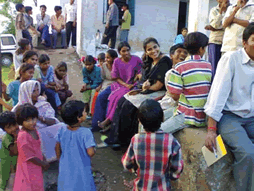
Durga, the Hindu goddess of power, is often depicted mounted on a tiger, her eight arms loaded for bear with a trident, a sword, a thunderbolt, a spear.... Some say this powerful goddess was born of the gods' fury over an illiterate demon who was wreaking havoc on Earth. Pallavi Shukla's first student, was named Durga. Ironic, says Shukla, since Durga couldn't write the alphabet when they started. "She was a great student, and she picked up everything very quickly," Shukla explains, "but she'd had a spotty education and needed to get back on track."
Just out of college, 2011 Riecker Fellow Pallavi Shukla found a job in New Delhi developing patches for Microsoft. As an electronics and telecommunications engineer, the work was ideal. But it wasn't enough for Shukla, who loved working with people, and wanted to get out from behind a desk and do something. Education, she thought, had given her the tools she needed to move to a big city and make a lot of money, but also to decide what she wanted to do with her life. As such, she reasoned, it would be a powerful way to make a difference in the lives of India's poor.
It's not that India doesn't have schools for the poor, Shukla explains, but that the country's public schools are almost entirely attended by the poor, while the country's private schools cater to the wealthy. "I could ask a kid which school he goes to, and I could tell the economic strata his parents belong to," says Shukla. She describes asking poor children what they wanted to be when they grew up, and hearing them say farmers, housewives, or bus conductors. When she asked her cousins, though, they would say doctors and astronauts.
"When poor kids go to schools for the poor, their world view isn't broadened by education," Shukla explains. "Education should teach them not only to expect good things, but to reject what's not right." In addition, the families of India's poor, first-generation students haven't been very effective at holding teachers accountable for quality education. In general, they don't expect much of teachers, or have high hopes that education will provide their children with a path out of poverty.
 |
|
Shukla and her students en-route to a study tour of a nearby national park. |
Shukla convinced her father and uncles to donate a large family property in Lakhimpur, one of the 100 poorest rural areas in India, and to help her build a school there. What was far more difficult, she recalls, was convincing local families to send their children. Parents would tell her, "Our daughters aren't going to get an education and get a job in the government; they're going to get married, and do household chores. They might as well start early."
In time, however, Shukla recruited her students. First the girls, whom she taught outside by day while she and her father watched the builders construct the school at night. Later, the boys. "It was much easier to convince the parents of the boys," recalls Shukla, tellingly.
Today, the Balbhadra Prasad Shukla (BPS) Public School enrolls 700 K-8 children, employs 34 teachers and a number of administrators, and is overseen by a school board (Shukla continues to serve on the board). Shukla and her board recently lobbied their state representative to introduce and support a local bill that would require wealthy schools to fill 25 percent of their seats with children below the poverty line. A former teacher, the state representative didn't take much convincing, says Shukla, in praise of his support. Still, the pace of change can be frustratingly slow.
Pallavi Shukla is now a first-year master's student focusing on education policy at the Ford School. After founding the BPS Public School, she went on to earn a master's degree in rural management, to lead educational initiatives for indigenous populations in the state of Gujarat, and to work with Ford School alumna Tannistha Datta (MPA '09) implementing UNICEF's child protection agenda in the state. She hopes to return to India to develop and support policies that will improve the education system for all of the country's children—rich and poor alike.
"When poor kids go to schools for the poor, their world view isn't broadened by education," Shukla explains. "Education should teach them not only to expect good things, but to reject what's not right."
Below is a formatted version of this article from State & Hill, the magazine of the Ford School. View the entire Winter 2012 State & Hill here.